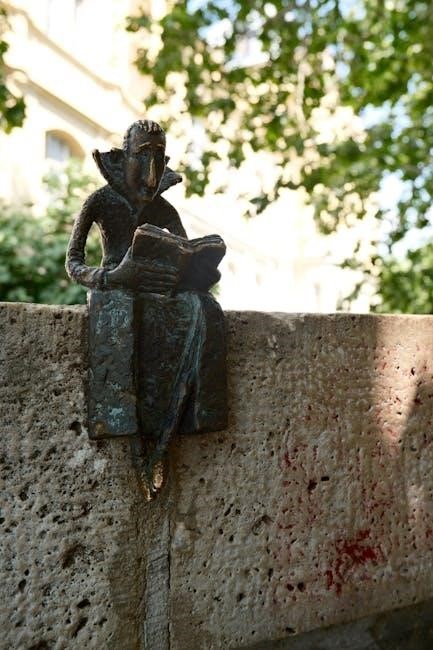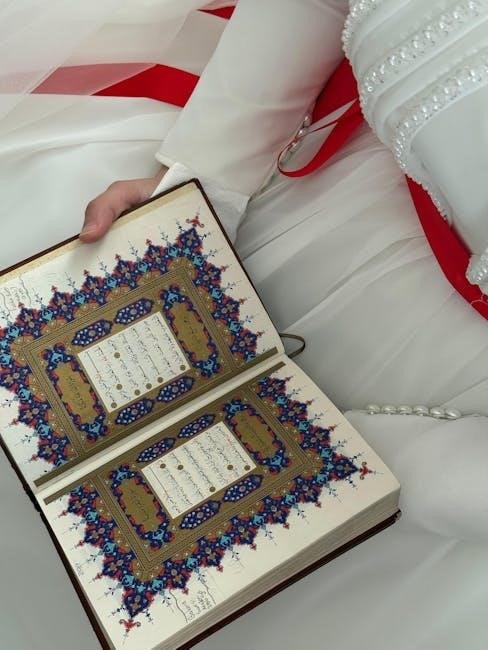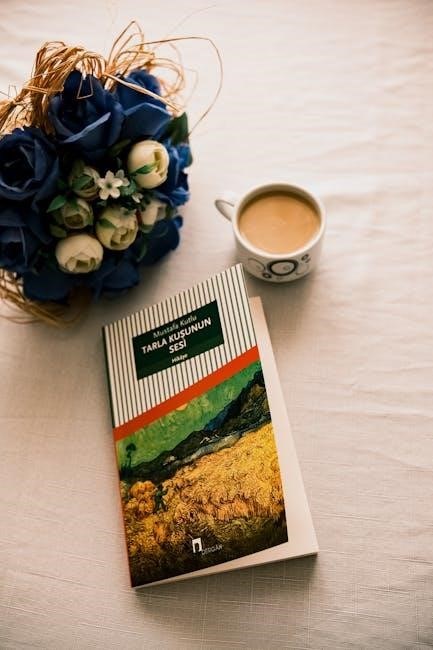Lolita, a significant 20th-century novel by Vladimir Nabokov, explores complex themes of obsession and moral ambiguity, sparking intense debates and leaving a lasting impact on literature and culture.
1.1 Overview of Vladimir Nabokov and His Work
Vladimir Nabokov (1899–1977) was a Russian-American novelist, poet, and literary critic, renowned for his innovative prose and complex characters. Born in Saint Petersburg, Russia, he fled the Bolshevik Revolution, settling in the U.S. in 1940. Nabokov’s writing often explored themes of memory, identity, and moral complexity. His unique narrative style, blending lyricism with dark humor, set him apart. Lolita, his most controversial work, showcased his mastery of language and psychological depth, cementing his legacy as one of the 20th century’s greatest writers.
1.2 Historical Context of the Book’s Publication
Lolita, written by Vladimir Nabokov, was first published in 1955 by Olympia Press in Paris. The novel faced immediate censorship and bans in several countries due to its controversial subject matter. Despite this, it gained notoriety and became a literary sensation. In 1958, the book was finally published in the United States after a legal battle, sparking widespread debate. Its release marked a significant moment in literary history, challenging societal norms and censorship laws, and solidifying its place as a provocative and enduring work of modern literature.
1.3 Why “Lolita” is a Controversial Novel
Lolita is controversial due to its depiction of a taboo relationship between Humbert Humbert and the young Dolores Haze. The novel’s exploration of obsession, manipulation, and moral ambiguity has sparked intense debate. Its narrative, told from Humbert’s perspective, challenges readers to confront uncomfortable themes. The book’s intricate prose and dark humor further complicate its reception, as Nabokov masterfully blurs the line between beauty and horror. Legal bans and societal outrage followed its release, cementing its reputation as a provocative and divisive work in modern literature.
Plot Summary of “Lolita”
Lolita revolves around Humbert Humbert’s obsessive relationship with Dolores Haze, a young girl. The novel traces their complex, morally charged dynamic and its devastating consequences.
2.1 The Relationship Between Humbert Humbert and Dolores Haze
Humbert Humbert’s obsession with Dolores Haze, known as Lolita, drives the novel’s narrative. Their relationship is marked by manipulation, control, and moral ambiguity. Humbert, a middle-aged scholar, becomes infatuated with the young girl, rationalizing his desires through twisted logic. Lolita, though often portrayed as a victim, exhibits complexity in her interactions with Humbert. The dynamic between them is both disturbing and deeply human, raising questions about consent, power, and the blurred lines between love and exploitation.
2.2 Key Events and Turning Points in the Story
The narrative unfolds with Humbert Humbert’s manipulative pursuit of Dolores Haze, beginning with his marriage to her mother, Charlotte, to gain access to Lolita. A pivotal moment occurs when Charlotte discovers Humbert’s true intentions, leading to her accidental death. This allows Humbert to take Lolita on a cross-country trip, where his control over her intensifies. Lolita’s eventual escape with Clare Quilty marks a turning point, as Humbert’s grip loosens. The story concludes tragically, with Humbert murdering Quilty and Lolita’s fate sealed in a heartbreaking denouement.
2.3 The Psychological Depth of the Characters
Humbert Humbert’s complex psyche reveals a man torn between charm and depravity, driven by an obsessive desire for Lolita. His narrative voice manipulates perceptions, blurring the line between victim and predator. Lolita, though often seen as a victim, exhibits resilience and agency, challenging Humbert’s control. Charlotte Haze’s naivety and tragic fate highlight her role as an unwitting catalyst. Clare Quilty’s influence further complicates the dynamics, deepening the psychological tension. The characters’ layered motivations and flaws create a profound exploration of human morality and manipulation.

Themes in “Lolita”
Lolita explores themes of obsession, manipulation, and moral ambiguity, delving into the darker aspects of human nature and the ethical dilemmas surrounding forbidden relationships and power dynamics.
3;1 Obsession and Its Consequences
Obsession is a central theme in Lolita, as Humbert Humbert’s fixation on Dolores Haze drives the narrative and leads to devastating consequences. His all-consuming passion distorts reality, creating a toxic dynamic where manipulation and control dominate. The novel explores how obsession can warp perceptions, leading to moral decay and emotional destruction. Through Humbert’s downward spiral, Nabokov examines the destructive power of unchecked desire, revealing the profound psychological and ethical consequences of obsession. The novel serves as a cautionary tale about the dangers of allowing obsession to govern human behavior.
3.2 Manipulation and Power Dynamics
Manipulation is a pervasive element in Lolita, as Humbert Humbert employs deceit and psychological control to exploit Dolores Haze. His narrative often justifies his obsession, creating a distorted reality where he portrays himself as a victim. This manipulation extends to the reader, challenging perceptions of morality and accountability. The novel critiques the dynamics of power, highlighting how abusers exploit vulnerability and manipulate truth to maintain control. Through Humbert’s actions, Nabokov exposes the ethical complexities of coercion and the devastating impact of such power imbalances on individuals and relationships.
3.3 Moral Ambiguity and Ethical Dilemmas
Lolita delves into profound moral ambiguity, as Humbert Humbert’s narrative blurs the lines between justification and condemnation. His obsession with Dolores Haze raises ethical dilemmas, forcing readers to confront the nature of consent, power, and exploitation. Nabokov’s masterful portrayal challenges moral certainty, presenting a deeply flawed protagonist whose actions are both reprehensible and tragically human. The novel provokes reflection on societal norms and personal ethics, leaving readers grappling with the complexities of right and wrong in a deeply unsettling yet thought-provoking manner.

Narrative Style and Structure
Lolita showcases Nabokov’s unique prose, blending lyrical language with a non-linear narrative. The unreliable narrator, Humbert Humbert, crafts a complex, layered story that challenges reader perceptions and moral judgments.
4.1 Unreliable Narrator and Its Impact
Humbert Humbert, the narrator of Lolita, is notoriously unreliable, as his obsession and biases distort the narrative. His manipulative storytelling blurs the line between truth and fiction, forcing readers to question the validity of his claims. This unreliability creates moral ambiguity, making it difficult to discern Humbert’s justifications from reality. The narrator’s skewed perspective challenges readers to critically analyze his motives, ultimately shaping the novel’s complex exploration of power dynamics and ethical dilemmas.
4.2 Use of Language and Literary Devices

Vladimir Nabokov’s masterful use of language in Lolita is both lyrical and intricate, employing wordplay, alliteration, and layered meanings to reflect Humbert’s obsessive and intellectual nature. The novel’s prose is rich with poetic flourishes, while itsstructure is layered with literary allusions that add depth; Nabokov’s writing style blurs the line between poetry and prose, creating a unique narrative voice that captivates and unsettles readers. This linguistic brilliance underscores the novel’s enduring influence on modern literature and its exploration of complex themes.
4.3 Non-Linear Storytelling Techniques
Nabokov employs non-linear storytelling in Lolita to enhance its psychological complexity. The narrative jumps between past and present, with Humbert Humbert reflecting on events retrospectively. This structure mirrors Humbert’s obsessive mind, revealing fragments of his relationship with Dolores Haze in a disjointed yet deliberate manner. The non-linear approach builds suspense and underscores the novel’s themes of memory, manipulation, and the unreliability of narration. This technique challenges readers to piece together the timeline, adding depth to the story’s moral and emotional layers.
Cultural and Social Impact
Lolita sparked worldwide controversy, leading to bans and heated debates. Its exploration of taboo themes influenced literature and pop culture, making it a culturally significant and enduring work.
5.1 The Controversy Surrounding the Book
Lolita has been a center of controversy since its publication in 1955. Its depiction of a relationship between Humbert Humbert and the young Dolores Haze sparked moral debates and legal challenges. Many viewed the novel as obscene, leading to bans in several countries. Despite its literary acclaim, critics condemned its themes, while others defended it as a profound exploration of obsession and power dynamics. The book’s notoriety has endured, making it one of the most divisive works in modern literature, with ongoing discussions about its artistic value versus its controversial content.
5.2 Bans and Legal Challenges
Lolita faced numerous bans and legal challenges worldwide due to its controversial content. In France, it was banned until 1958, while in England, its publication was delayed until 1959. Several countries, including Argentina, attempted to restrict its circulation. Legal battles often centered on obscenity charges, with governments threatening to destroy copies. Nabokov defended his work as a serious literary exploration, not pornography. Despite these challenges, the book’s notoriety fueled its popularity, with the 1962 film adaptation further cementing its cultural impact, proving that controversy often amplifies a work’s enduring relevance.
5.3 Public Perception Over the Years
Lolita has sparked intense public debate since its release, evolving from scandalous outrage to recognition as a literary masterpiece. Initially, its explicit themes shocked audiences, leading to widespread moral criticism. Over time, however, the novel gained acclaim for its complex narrative and psychological depth. Today, it is celebrated as a landmark of 20th-century literature, though debates about its ethical implications persist. Its influence on popular culture and continued relevance in modern discussions underscore its enduring impact on society and literature alike, making it a timeless yet controversial classic.

Availability of “Lolita” in PDF Format
Lolita is widely available in PDF format through legal ebook services, offering readers convenient access to this controversial yet iconic novel in high-quality digital formats.
6.1 Legal Sources for Downloading the Book

Lolita can be legally downloaded in PDF format from reputable ebook platforms like LitRes, Google Drive, and official bookstores. These services offer high-quality digital versions, ensuring readers access the novel legally while supporting the author and publishers. Many platforms provide formats such as PDF, EPUB, and FB2, catering to different reader preferences; Official sources guarantee an uninterrupted reading experience, free from copyright violations, making them the recommended choice for accessing this iconic novel.
6.2 Benefits of Digital Formats for Readers
Digital formats of Lolita offer convenience, portability, and enhanced reading experiences. PDF versions allow readers to access the book on multiple devices, adjust font sizes, and utilize features like bookmarks and search functions. Digital copies also enable easy storage, reducing the need for physical space. Additionally, platforms often provide annotations, summaries, and resources that deepen understanding. The ability to download and carry the book anywhere makes it ideal for travelers and avid readers seeking flexibility. Digital formats further promote accessibility, ensuring the novel reaches a broader audience worldwide.
6.3 Popular Platforms Offering the PDF Version
Lolita in PDF format is accessible through various platforms like Google Drive, LitRes, and online libraries. These sites offer high-quality downloads, ensuring readability on multiple devices. Readers can also explore additional formats such as EPUB and FB2. Popular platforms provide easy navigation, allowing users to search and download the book efficiently. Some services include annotations and summaries, enhancing the reading experience. This accessibility ensures that Nabokov’s masterpiece reaches a global audience, maintaining its cultural and literary significance in the digital age.

Adaptations and Interpretations
Lolita has inspired numerous adaptations, including films like the 1962 and 1997 versions, stage plays, and interpretations in art and literature, cementing its cultural influence and provocative themes.
7.1 Film Adaptations of “Lolita”
Lolita has been adapted into multiple films, including the 1962 version directed by Stanley Kubrick and the 1997 adaptation by Adrian Lyne. These films capture the novel’s complex themes, with notable performances by James Mason and Jeremy Irons as Humbert Humbert. Despite challenges in portraying the controversial story, the films remain significant, offering visual interpretations of Nabokov’s intricate narrative and ethical dilemmas, while sparking debates about the balance between artistic expression and sensitive subject matter.
7.2 Stage Plays and Other Performances
Lolita has inspired numerous stage adaptations, with playwrights exploring its complex themes of obsession and moral ambiguity. These performances often face challenges due to the novel’s controversial nature, but they provide a unique opportunity to reinterpret Nabokov’s narrative in a live setting. The play adaptations delve into the psychological depths of Humbert Humbert and Dolores Haze, offering audiences a fresh perspective on the story’s ethical dilemmas. Such performances highlight the enduring relevance of Lolita in contemporary cultural discourse.
7.3 Influence on Other Literary Works
Lolita has profoundly influenced modern literature, inspiring authors to explore themes of obsession, morality, and complex narratives. Its intricate prose and controversial subject matter have made it a benchmark for writers tackling taboo topics. Many literary works now incorporate unreliable narrators and non-linear storytelling, techniques popularized by Nabokov. The novel’s exploration of ethical ambiguity has also encouraged deeper psychological character development in contemporary fiction, solidifying its role as a pivotal work in shaping 20th-century literature and beyond.
Critical Reception
Lolita has received mixed reviews, with some praising its literary brilliance and others condemning its controversial themes. Critics highlight its complex narrative and psychological depth, while debates over its moral implications continue.
8.1 Positive Reviews and Praise
Lolita has been widely acclaimed for its literary brilliance, with critics praising its intricate narrative, psychological depth, and Nabokov’s masterful use of language. Graham Greene hailed it as a “distinguished novel,” while many reviewers noted its ability to balance dark themes with poetic prose. The book’s exploration of obsession and moral complexity has been praised for its boldness and intellectual depth. Its inclusion in Time Magazine’s “100 Best Novels” list underscores its enduring literary significance and influence on modern literature.
8.2 Negative Criticisms and Backlash
Lolita has faced intense criticism due to its controversial themes, with many labeling it immoral and disturbing. Critics argue that the novel romanticizes exploitation and trivializes abuse, sparking outrage and bans in several countries. The Manchester Guardian described it as a “disturbing book,” while others condemned its portrayal of a minor in a sexual context. Legal challenges and public backlash ensued, with some calling for the book’s censorship. Despite Nabokov’s literary skill, the novel’s content has led to ongoing ethical debates and polarized opinions among readers and scholars.
8.3 Scholarly Analysis and Interpretations
Lolita has been subject to extensive scholarly analysis, with academics exploring its complex narrative structure, moral ambiguity, and psychological depth. Scholars often highlight Nabokov’s mastery of language and the novel’s layered meanings, which invite multiple interpretations. The unreliable narrator, Humbert Humbert, has been a focal point of discussion, with critics debating his credibility and the ethical implications of his perspective. The novel’s exploration of obsession, power dynamics, and the blurring of truth and fiction continues to inspire academic debates, cementing its reputation as a intellectually challenging and thought-provoking work.

Reading “Lolita” Online
Reading “Lolita” online offers convenience and accessibility, with platforms like LitRes providing digital formats such as PDF, ePub, and more, allowing readers to enjoy the novel anytime, anywhere.
9.1 Benefits of Online Reading Platforms
Online reading platforms offer unparalleled convenience, providing instant access to Lolita in formats like PDF, ePub, and fb2. These platforms enable readers to access the book anytime, anywhere, without physical storage constraints. Features like adjustable fonts, night mode, and bookmarking enhance readability. Additionally, online platforms often include community discussions, reviews, and annotations, fostering deeper engagement. They also ensure global accessibility, overcoming regional bans or availability issues, making Lolita reachable to a broader audience while preserving the integrity of Nabokov’s prose.
9.2 Guides for First-Time Readers
First-time readers of Lolita should approach the novel with an understanding of its complex narrative style and controversial themes. It is essential to recognize Humbert Humbert’s unreliable narration and critically analyze his perspective. Readers should familiarize themselves with the historical context and Nabokov’s unique literary techniques. Paying attention to the novel’s themes of obsession, manipulation, and moral ambiguity will enhance comprehension. Additionally, being aware of the book’s controversial reputation and preparing for its emotionally challenging content can provide a more informed and thoughtful reading experience.
9.3 Discussing the Book in Online Communities
Online communities actively engage with Lolita, fostering lively discussions about its themes and complexities. Forums, social media groups, and book clubs often debate the novel’s moral ambiguity and Nabokov’s narrative techniques. Many readers share insights into Humbert Humbert’s psyche and the controversial nature of his obsession. These platforms also provide spaces for first-time readers to seek guidance and share reactions. Engaging in such discussions can deepen understanding and offer diverse perspectives on the book’s enduring impact and relevance in modern literature.

The Legacy of “Lolita”
Lolita remains a landmark novel, influencing modern literature with its complex themes and narrative style. Its controversial nature ensures continued relevance in cultural and literary discussions worldwide.
10.1 Influence on Modern Literature
Lolita has profoundly shaped modern literature, inspiring authors to explore complex themes like obsession and moral ambiguity. Its intricate narrative and unreliable narrator have influenced storytelling techniques, encouraging deeper reader engagement. As one of Time’s 100 best novels, it continues to challenge literary norms, inspiring contemporary writers to tackle taboo subjects with boldness and depth. Its lasting impact ensures its relevance in the literary world, making it a cornerstone of 20th-century fiction.
10.2 Cultural References and Pop Culture Impact
Lolita has left an indelible mark on pop culture, inspiring countless references in films, music, and literature. Its themes of obsession and moral complexity continue to captivate audiences, making it a cultural touchstone. The book’s provocative nature has led to numerous adaptations and allusions, solidifying its place in the zeitgeist. Nabokov’s masterpiece remains a subject of fascination, influencing art and media while sparking ongoing debates about its controversial content and enduring appeal.
10.3 Continued Relevance in Contemporary Discussions
Lolita remains a focal point in modern debates due to its exploration of obsession, power dynamics, and moral ambiguity. Its themes resonate with contemporary discussions on consent, exploitation, and societal norms. The novel’s psychological complexity continues to inspire scholarly analysis and public discourse. Despite its controversial nature, Lolita is widely studied, adapting its relevance to changing cultural values and ethical perspectives, ensuring its place in ongoing literary and societal conversations. Its availability in PDF and online formats further facilitates its accessibility and enduring impact.
About the Author
Vladimir Nabokov was a renowned Russian-American novelist, born in 1899 in Saint Petersburg; His unique prose and intricate storytelling in works like Lolita and Invitation to a Beheading showcased his literary genius, blending lyricism with psychological depth, leaving an indelible mark on 20th-century literature.
11.1 Vladimir Nabokov’s Biography
Vladimir Nabokov was a Russian-American novelist, born on April 22, 1899, in Saint Petersburg, Russia. He came from an aristocratic family and was multilingual from an early age, which deeply influenced his writing. After the Russian Revolution, Nabokov moved to Germany and later to the United States, where he became a naturalized citizen in 1945. Known for his unique prose and exploration of themes like obsession and moral ambiguity, Nabokov wrote prolifically, producing works like Pale Fire and Speak, Memory.
His most famous novel, Lolita, published in 1955, sparked both acclaim and controversy. Nabokov later moved to Switzerland, where he lived until his death on July 2, 1977. His legacy as a literary master continues to endure, with Lolita remaining a central work in his oeuvre.
11.2 His Other Notable Works
Vladimir Nabokov’s literary legacy extends far beyond Lolita. His other notable works include Pale Fire, a novel known for its complex narrative structure, and Speak, Memory, a memoir that offers a glimpse into his aristocratic upbringing and exile experiences. Additionally, Invitation to a Beheading and The Gift are celebrated for their exploration of themes like existential despair and intellectual curiosity. These works highlight Nabokov’s mastery of language and his ability to craft intricate, thought-provoking stories.
11.3 Nabokov’s Writing Style and Philosophy
Vladimir Nabokov’s writing style is characterized by meticulous attention to detail, lyrical prose, and a mastery of language. His works often explore themes of memory, identity, and the duality of human nature. Nabokov believed in the importance of precision and craftsmanship, often revising his texts extensively. His philosophical approach to literature emphasized the pursuit of beauty and truth, blending intellectual depth with artistic expression. This unique style has left an indelible mark on modern literature, challenging readers to engage deeply with his narratives.
Lolita remains a controversial yet brilliant exploration of human complexity, leaving readers with profound questions about morality, desire, and the power of storytelling. Nabokov’s masterpiece endures.

12.1 Final Thoughts on “Lolita”
Lolita is a masterpiece of controversial storytelling, blending brilliance with moral complexity. Its exploration of obsession and manipulation challenges readers to confront uncomfortable truths. Nabokov’s prose is both poetic and provocative, leaving a lasting impact on literature. The novel’s themes of power dynamics and ethical dilemmas continue to spark debates, ensuring its relevance in modern discussions. Available in PDF formats, Lolita remains accessible to new generations, inviting readers to grapple with its profound and unsettling narrative. Its influence on culture and literature is undeniable, solidifying its place as a timeless classic.
12.2 Encouragement to Read the Book
Reading Lolita is an unparalleled literary experience, offering profound insights into human psychology and morality. Its intricate narrative and vivid prose make it a must-read for literature enthusiasts. Available in convenient PDF formats, the book is easily accessible for modern readers. Embrace the opportunity to engage with Nabokov’s masterpiece, which continues to spark essential discussions about obsession, power, and ethics. Despite its controversial nature, Lolita remains a timeless classic that challenges and enriches readers, ensuring its relevance in contemporary literature.
12.3 The Enduring Significance of “Lolita”
Lolita remains a cornerstone of modern literature, its influence evident in cultural references and ongoing debates. Its exploration of obsession, morality, and power dynamics continues to resonate, making it a timeless classic. Despite controversy, the novel’s intricate prose and psychological depth ensure its relevance. Available in PDF and other digital formats, Lolita reaches new generations, sparking essential discussions about ethics and human complexity. Its enduring significance lies in its ability to challenge readers and inspire reflections on society and individual behavior.
